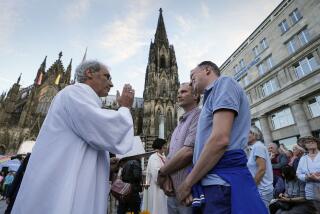Gay-Oriented Church Joins Area Council
- Share via
In a move toward the mainstream, the gay-oriented Metropolitan Community Church has been admitted to the Southern California Ecumenical Council, but a prominent Eastern Orthodox priest said Thursday that the action “raises troubling questions” for the Eastern churches.
The council has admitted the Universal Fellowship of Metropolitan Community Churches, which oversees 330 congregations worldwide from its new headquarters in West Hollywood and routinely performs same-sex weddings.
When the Metropolitan church applied about 15 years ago for membership in the National Council of Churches and the regional Los Angeles body, it was rebuffed.
But the Southern California Ecumenical Council, meeting on Feb. 13 in Pasadena, upgraded the status of the Metropolitan church from observer to member after a 10-minute discussion with no dissent, said the Rev. Al Cohen, the council’s executive director.
However, the decision “is going to be difficult to accept” for the Southern California Council of Orthodox Churches, which is also a member of the Ecumenical Council, said Father Michael Laffoon of St. Mark Antiochian Orthodox Church in Irvine.
Laffoon, who was not present at the Ecumenical Council meeting, raised the possibility that the Orthodox church council, of which he is president, may withdraw because the MCC’s acceptance of gay and lesbian sexuality “is not in accordance with the traditional Christian understanding of the homosexual lifestyle as immoral.”
The 18-church Southern California Ecumenical Council “would hate to lose the Orthodox church, but I understand that they have to stand by their position,” said council President Sally Welch, a Christian Church (Disciples of Christ) minister.
“The MCC met our basic criterion of belief in Jesus Christ as savior,” Welch said. “I would always rather err on the side of inclusion rather than exclusion.”
The Southern California Ecumenical Council’s decision followed an identical step Jan. 1 by the Sacramento-based California Council of Churches and its lobbying arm at the state capital, California Church Impact.
The MCC was admitted by a unanimous vote as the 19th member of the California Council of Churches, which represents the legislative concerns of United Methodists, Presbyterians, Episcopalians and other so-called mainline, or ecumenical, Protestant church bodies, said Scott Anderson, executive director of the California Council.
For the Metropolitan church, which last year purchased a $3.8-million headquarters and church complex in West Hollywood, admittance to the two councils is significant for practical and psychological reasons, said the Rev. Nancy Wilson, senior pastor of Los Angeles MCC.
“It’s important because we have common interests in justice and welfare issues, and for our own sense of having friends and allies--not being isolated as a community,” said Wilson, who has led the denomination’s ecumenical relations for 20 years.
Individual MCC congregations have had an easier time joining local councils, said the Rev. Jeffrey Pulling, pastor of the Metropolitan Community Church in the Valley in North Hollywood.
“Our church has been a full member of the San Fernando Valley Interfaith Council for years,” Pulling said. The Metropolitan Community Church in the Valley is one of five congregations in the interfaith council currently taking part in a program to house, feed and train 12 homeless men over 10 weeks.
The national membership issue was highly controversial in the early 1980s when the denomination, founded in 1968 by the Rev. Troy Perry in Huntington Park, appeared to meet the criteria of size and religious creed in order to join the National Council of Churches.
But the National Council’s governing board tabled the matter in 1983 under threat of withdrawal by Orthodox bishops and amid expressions of uneasiness by representatives of some Protestant denominations.
Periodically under attack from conservative church leaders as too liberal in theology and social issues, the National Council went further in 1992 by eliminating observer status for any nonmember religious body, thus denying the MCC a position it had used to maintain contacts with other denominations.
“It’s a matter of economics,” Wilson suggested. “Taking any position that might seem to be left wing is dangerous economically for member denominations.”
Nevertheless, some theologically conservative churches tend to ignore the low-budget councils of churches as irrelevant because ecumenical bodies possess no religious or administrative authority over their members.
“These sorts of organizational alliances generally don’t affect local congregations,” said the Rev. Scott Hilborn, pastor of Canoga Park Presbyterian Church. “I don’t think it disturbs conservatives like myself because their commonality seems to be mainline liberalism.”
Yet the Southern California Ecumenical Council, which was virtually dormant a few years ago, rebounded in the last year, adding its voice, for instance, to the Catholic Church’s opposition to Proposition 209, the anti-affirmative action measure on the ballot last fall.
More to Read
Sign up for Essential California
The most important California stories and recommendations in your inbox every morning.
You may occasionally receive promotional content from the Los Angeles Times.










